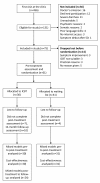Acceptability, effectiveness, and cost-effectiveness of internet-based exposure treatment for irritable bowel syndrome in a clinical sample: a randomized controlled trial
- PMID: 21992655
- PMCID: PMC3206465
- DOI: 10.1186/1471-230X-11-110
Acceptability, effectiveness, and cost-effectiveness of internet-based exposure treatment for irritable bowel syndrome in a clinical sample: a randomized controlled trial
Abstract
Background: Internet-based cognitive behavior therapy (ICBT) has shown promising effects in the treatment of irritable bowel syndrome (IBS). However, to date no study has used a design where participants have been sampled solely from a clinical population. We aimed to investigate the acceptability, effectiveness, and cost-effectiveness of ICBT for IBS using a consecutively recruited sample from a gastroenterological clinic.
Methods: Sixty-one patients were randomized to 10 weeks of ICBT (n = 30) or a waiting list control (n = 31). The ICBT was guided by an online therapist and emphasized acceptance of symptoms through exposure and mindfulness training. Severity of IBS symptoms was measured with the Gastrointestinal symptom rating scale--IBS version (GSRS-IBS). Patients in both groups were assessed at pre- and post-treatment while only the ICBT group was assessed 12 months after treatment completion. Health economic data were also gathered at all assessment points and analyzed using bootstrap sampling.
Results: Fifty of 61 patients (82%) completed the post-treatment assessment and 20 of 30 patients (67%) in the ICBT group were assessed at 12-month follow-up. The ICBT group demonstrated significantly (p < .001) larger improvements on the IBS-related outcome scales than the waiting list group. The between group effect size on GSRS-IBS was Cohen's d = 0.77 (95% CI: 0.19-1.34). Similar effects were noted on measures of quality of life and IBS-related fear and avoidance behaviors. Improvements in the ICBT group were maintained at 12-month follow-up. The ICBT condition was found to be more cost-effective than the waiting list, with an 87% chance of leading to reduced societal costs combined with clinical effectiveness. The cost-effectiveness was sustained over the 12-month period.
Conclusions: ICBT proved to be a cost-effective treatment when delivered to a sample recruited from a gastroenterological clinic. However, many of the included patients dropped out of the study and the overall treatment effects were smaller than previous studies with referred and self-referred samples. ICBT may therefore be acceptable and effective for only a subset of clinical patients. Study dropout seemed to be associated with severe symptoms and large impairment. Objective and empirically validated criteria to select which patients to offer ICBT should be developed.
Trial registration: ClinicalTrials.gov: NCT00844961.
Figures
References
-
- Drossman DA, Li Z, Andruzzi E, Temple RD, Talley NJ, Thompson WG, Whitehead WE, Janssens J, Funch-Jensen P, Corazziari E. et al. U.S. householder survey of functional gastrointestinal disorders. Prevalence, sociodemography, and health impact. Dig Dis Sci. 1993;38(9):1569–1580. doi: 10.1007/BF01303162. - DOI - PubMed
Publication types
MeSH terms
Associated data
LinkOut - more resources
Full Text Sources
Other Literature Sources
Medical



